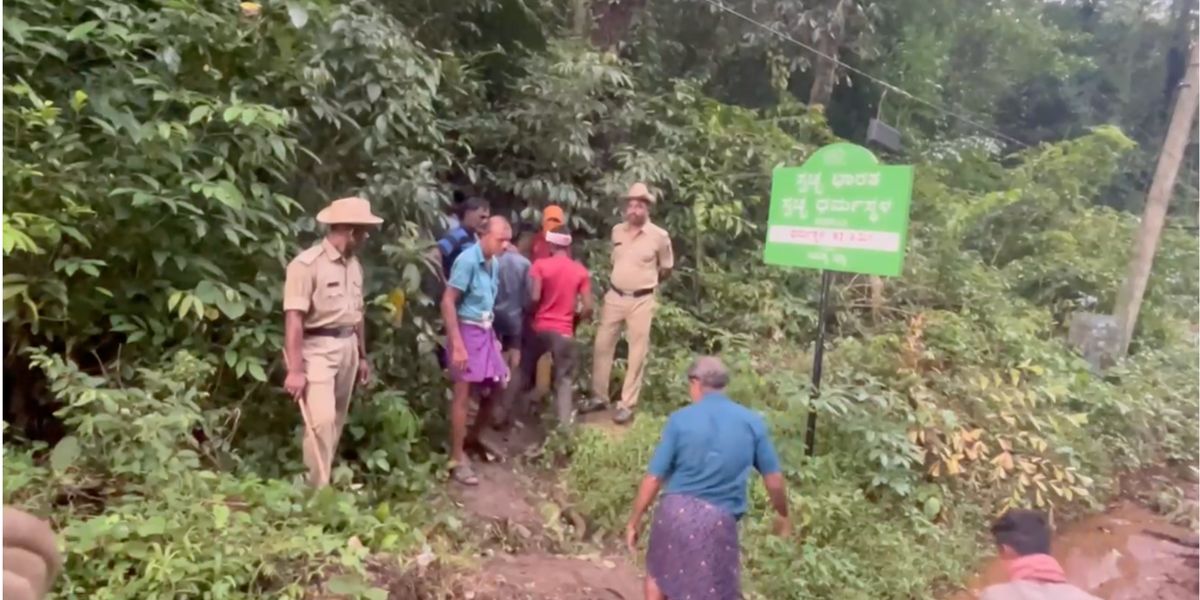The matter has been posted for further hearing on 12 November.
Published Oct 30, 2025 | 9:59 PM ⚊ Updated Oct 30, 2025 | 9:59 PM

The police team during the exhumation process in Dharmasthala.
Synopsis: Seeking quashing of the FIR, the activists said in their petition, “The FIR was initially registered for an offence under Section 211(a) BNS — a non-cognisable offence — without obtaining a reasoned order of the jurisdictional Magistrate under Section 175(2) BNSS, thereby rendering the registration itself without jurisdiction.”
The Karnataka High Court on Thursday, 30 October, ordered an interim stay into the Dharmasthala mass burials case investigation till 12 November.
The stay came after a petition filed by activists Girish Mattanavar, Mahesh Thimmarodi, Jayant T, and Vittal Gowda who had sought the quashing of the FIR filed by the Dharmasthala police based on the complaint of Chinnaiah.
The complainant had alleged that he had buried several bodies illegally at the behest of the temple administration in Dharmasthala. The four activists were also questioned by the SIT after they backed the claims of the complainant.
Seeking quashing of the FIR, the activists said in their petition, “The FIR was initially registered for an offence under Section 211(a) BNS — a non-cognisable offence — without obtaining a reasoned order of the jurisdictional Magistrate under Section 175(2) BNSS, thereby rendering the registration itself without jurisdiction.”
Their petition further alleged that on 23 August, the respondent-SIT unilaterally amended the FIR and added numerous new sections, including Sections 229, 230 and 231 BNS (corresponding to the old Sections 193-195 IPC), which are non-cognisable and triable only on the complaint of the concerned court.
“No such complaint was made by any court, nor was any permission obtained through a reasoned order from a Magistrate under Section 174(2) BNSS to investigate these offences,” the writ petition said.
The petition further stated that, rather than initiating perjury proceedings against the complainant after the police allegedly discovered inconsistencies in his statements and the documents he submitted to investigators, “the SIT has taken the unprecedented step of presenting the same individual once again before the same Magistrate to record a second statement that contradicts the first. It now appears likely that the SIT will summon the present Applicant and others on the basis of this contradiction,” the petition said.
“The above course of action constitutes a failure of justice. Once a person confesses to having lied before a Magistrate, the law mandates that he be prosecuted for perjury — not that the police build a fresh investigative narrative around his retraction,” the petition further said.
The four activists approached the court after they received fresh summons in the case on 24 October. The petition stated that they had been summoned and questioned for nine days in September 2025
“The Applicant apprehends further coercive action and repeated summons based on the newly-recorded contradictory statement, causing serious prejudice and infringement of his fundamental rights under Articles 14 and 21 of the Constitution of India,” the petition said.
The matter has been posted for further hearing on 12 November.
The complainant, a Dalit man, formerly employed as a sanitation worker at the Dharmasthala Manjunatha temple, alleged that between 1995 and 2014, he was forced under death threats to dispose of hundreds of bodies, many showing signs of sexual violence and brutal murders.
He identified 15 possible burial sites. The first eight locations were identified along the Nethravathi River. Locations 9 to 12 were beside the highway near the river. The 13th was on the road connecting Nethravathi to Aajukuri, and the remaining two, 14 and 15, were in the Kanyadi area near the highway.
The SIT had conducted exhumation at the sites identified by the complainant. Partial human skeletal remains were found at the sixth burial site on 31 July.
(Edited by Sumavarsha, with inputs from Anisha Reddy)
